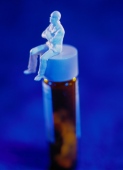
MONDAY, May 10 (HealthDay News) — Medicines used to treat Parkinson’s disease may increase the risk of impulse control disorders, such as problem gambling, compulsive shopping and binge eating, researchers warn.
In a new study that included 3,090 patients being treated for Parkinson’s at 46 movement disorder centers in the United States and Canada, the researchers found that 13.6 percent of the patients had impulse control disorders. These impulse disorders included gambling (5 percent), compulsive sexual behavior (3.5 percent), compulsive shopping (5.7 percent) and binge eating (4.3 percent), and nearly 4 percent of the patients had two or more of these disorders.
Impulse control disorders were more common among patients taking dopamine agonist medications (17.1 percent) than in those not taking the drugs (6.9 percent), the study authors found. Other factors associated with impulse control disorders were: use of levodopa (another treatment for Parkinson’s); living in the United States; being younger or unmarried; smoking cigarettes; and having a family history of gambling problems.
“Dopamine agonist treatment in Parkinson’s disease is associated with 2- to 3.5-fold increased odds of having an impulse control disorder,” wrote Dr. Daniel Weintraub, of the University of Pennsylvania, Philadelphia, and Philadelphia VA Medical Center, and colleagues. “This association represents a drug class relationship across impulse control disorders. The association of other demographic and clinical variables with impulse control disorders suggests a complex relationship that requires additional investigation to optimize prevention and treatment strategies.”
The researchers noted that dopamine agonists are increasingly being used to treat other conditions, such as fibromyalgia and restless legs syndrome.
“Larger . . . studies in these other populations are needed to examine the possible relationships between dopamine agonist treatment, other clinical features and impulse control disorders,” the authors concluded.
The study is published in the May issue of the journal Archives of Neurology.
More information
The Parkinson’s Disease Foundation has more about Parkinson’s disease patients and impulse control problems.

